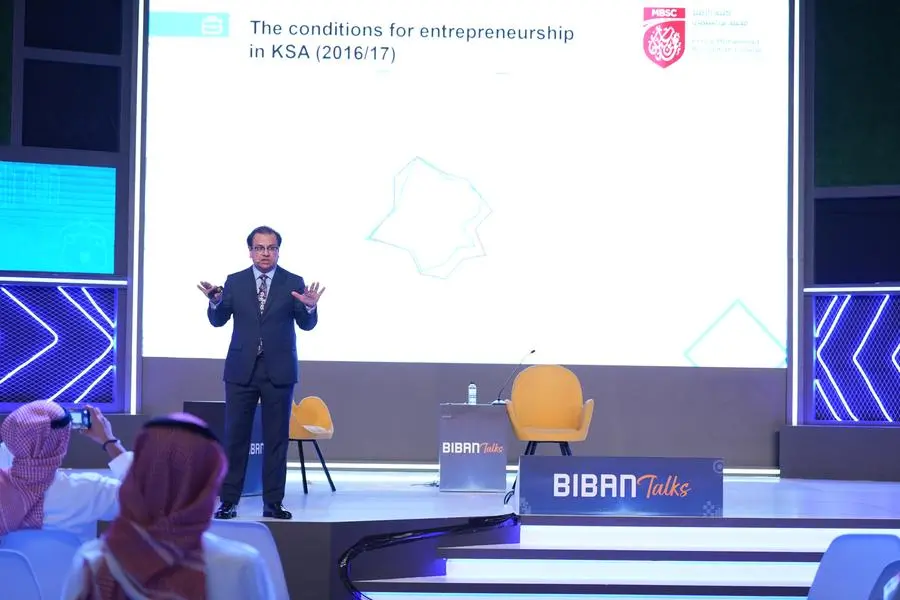PHOTO
King Abdullah Economic City: Prince Mohammed Bin Salman College of Business and Entrepreneurship (MBSC), a world-class business and entrepreneurship education leader, recently participated in the Biban 23 Forum through a session titled Entrepreneurial Ecosystem in KSA: Global Entrepreneurship Monitor Results (2016-2022).
Led by Dr. Muhammad Azam Roomi, Professor of Entrepreneurship at MBSC and team leader of the GEM Saudi Arabia Team, the session saw him highlight Saudi Arabia’s second-place ranking in the National Entrepreneurship Context Index (NECI), whose results appeared in the Global Entrepreneurship Monitor 2022/2023 Global Report: Adapting to a “New Normal”.
This 24th annual GEM Global Report draws on extensive survey results from 51 economies across the world. It defines the entrepreneurial environment of each economy through 13 Entrepreneurship Framework Conditions (EFCs):
- Entrepreneurial Finance: there are sufficient funds for new startups
- Ease of Access to Entrepreneurial Finance: and those funds are easy to access
- Government Policy — Support and Relevance: policies promote and support startups
- Government Policy — Taxes and Bureaucracy: new businesses are not over-burdened
- Government Entrepreneurial Programs: quality support programs are widely available
- Entrepreneurial Education at School: schools introduce entrepreneurial ideas
- Entrepreneurial Education Post-School: colleges offer courses in how to start a business
- Research and Development Transfers: research is easily transferred into new businesses
- Commercial and Professional infrastructure: quality services are available and affordable
- Ease of Entry — Market Dynamics: markets are free, open and growing
- Ease of Entry — Burdens and Regulations: regulations encourage not restrict entry
- Physical Infrastructure: good-quality, available and affordable
- Social and Cultural Norms: encourage and celebrate entrepreneurship
Saudi Arabia’s NECI ranking, which was based on its EFC scores, showed that its highest-rated conditions were its Physical Infrastructure, Ease of Entry — Market Dynamics, and Social and Cultural Norms. Its Entrepreneurial Education conditions, across all academic phases, were deemed the most improved.
The Kingdom, alongside the United Arab Emirates, experienced the most rapid improvements to its NECI score. Saudi Arabia’s score rose from 5.0 in 2019 to 6.3 in 2022. This score reflects its considerable investments into entrepreneurial environment enrichment, as well as consistent government-led efforts to counter the negative impacts of COVID-19 through a variety of measures, policies, and programs that extend to all aspects of its economic development and well-being.
“Saudi Arabia is a clear example of an economy that has invested heavily in its entrepreneurial environment in recent years and as a result, there has been significant improvement,” said Dr. Roomi. “Government policies have simplified the process of starting a firm and made it simpler for foreign corporations to invest in the economy, two factors that are essential to the Kingdom’s long-term development ambitions under Vision 2030.”
Highlights of the GEM 2022/2023 Global Report
- The percentage of adults in Saudi Arabia seeing good local opportunities to start a business rose by 16%.
- Saudi Arabia had the highest proportion of adults globally (almost nine out of 10) who reported knowing at least one new business founder in the past two years.
- Saudi Arabia had the highest proportion of adults globally (almost nine out of 10) who agreed that there would be good opportunities to start a local business within the next six months.
- The percentage of adults who agree that starting a new business is easy was highest in Saudi Arabia.
- Saudi Arabia had the highest rate of adults who agreed they had the knowledge, skills, and experience to start their own businesses.
- Saudi Arabia was one of only five economies in which more than one out of 10 adults had invested in someone else’s startup.
The Global Entrepreneurship Monitor is the world's foremost entrepreneurship research program. It began in 1999 as a joint project between Babson College (USA) and London Business School (UK), with the aim of building an understanding as to why some countries are perceived to be more 'entrepreneurial' than others.
Through a vast, centrally coordinated international data collection effort, GEM has provided high-quality information on a comprehensive variety of indicators about entrepreneurship in 116 economies over more than 20 years. GEM is a trusted resource for organizations around the world to help inform decision-making to improve the quantity and quality of entrepreneurial activity.
-Ends-




















